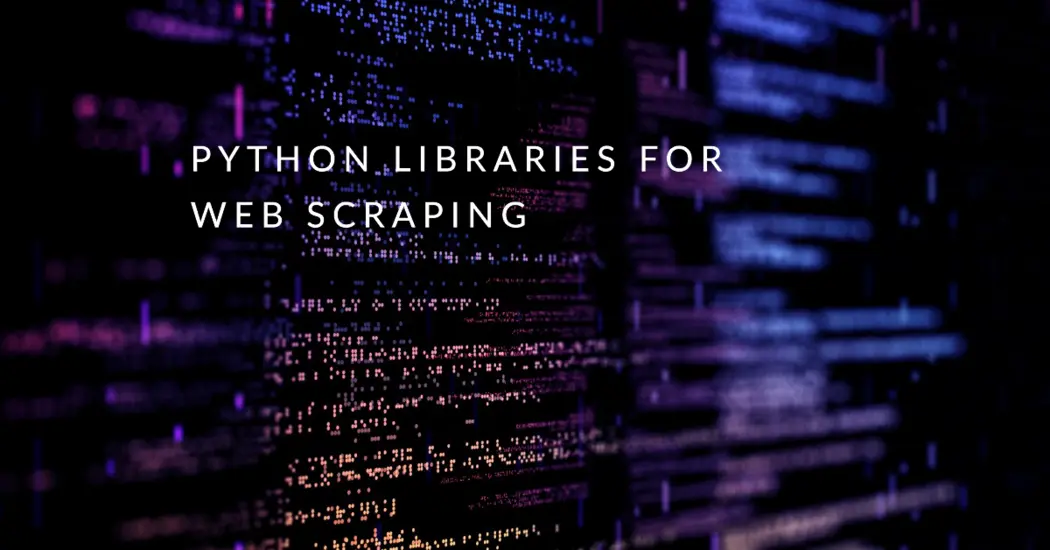Python stands out as one of the most effective tools available for data extraction from the web. It has been the best choice that many developers ever made due to its flexibility, and powerful. Python for web scraping already offers a lot of Libraries for more practical use and leads to web scraping that helps you to be efficient as well if the data size grows. No matter if you are a beginner or already have experience with web scraping, it is really important to learn which library fits your needs in different scenarios and when. This blog is aimed to provide an overview of a few important Python libraries for web scraping with suitable use cases.
The basics of web scraping
Before we get into the nitty-gritty, let’s refresh your memory! Web scraping is an automated extraction of data from web-sites for different business or research purposes. This is about getting data very, very quickly in a much more automated way.
Not all websites are easily accessible, though. Others have measures to prevent automated requests, and you might need a way to bypass these (ethically). There are various libraries in python that help not just with extracting data, but also manage issues like proxies, CAPTCHA troubles as well as the format of the data.
1. BeautifulSoup — Useful for simplistic scraping
We are going to start with BeautifulSoup which is excellent in parsing the HTML and XML documents available in python. A beginner and small scale friendly library that you can use to fetch data from static web pages using scraping perspectives.
It is really simple to use and the real power of BeautifulSoup lies in its ease. All one needs to do is retrieve elements like headings, links or tables from a webpage with minimum code.
Example
“`python
from bs4 import BeautifulSoup
import requests
url = ‘http://example.com’
response = requests.get(url)
soup = BeautifulSoup(response.text, ‘html.parser’)
Extract all headings (h1 tags)
headings = soup.find_all(‘h1’)
for heading in headings:
print(heading.text)
“`
This is the reason why BeautifulSoup is popular for small tasks. But that might not be good enough for a site with dynamic content to scrape from.
When to use BeautifulSoup:
- It’s perfect for smaller or less complicated scraping jobs.
- Static HTML pages.
Here, you need an advanced library in case the site is dynamic and that belongs to the next library.
2. Selenium: Best for JavaScript-Heavy websites
Selenium is perfectly designed for tasks such as extracting data from JavaScript heavy websites. Selenium, on the other hand does this by itself because Selenium plays actions directly with a browser unlike the BeautifulSoup.
So you can consider Selenium the browser automation software with bonus-scraping-capability. This can pull up the pages and load them completely, click to make different parts of content appear etc and then scrape full data.
Example
“`python
from selenium import webdriver
url = ‘http://example.com’
driver = webdriver.Chrome()
driver.get(url)
Extract text from an element
element = driver.find_element_by_tag_name(‘h1’)
print(element.text)
driver.quit()
“`
Selenium On the other hand, if you have a dynamic site, Selenium for sure is more brilliant, but dramatically slower as it has to load up an entire browser.
When to use Selenium:
- JavaScript-heavy sites.
- Interactive tasks such as filling form fields or clicking buttons.
3. Scrapy: The fundamental web scraping framework
Scrapy (more complex projects) a complete framework including everything from making requests, parsing the responses to managing data pipelines is called Scrapy.
Scrapy is one of the fastest web scrapers. Activates asynchronous requests, which makes the data editing process much more efficient. It provides inbuilt functionality for retries, proxy rotation etc.
Example
“`bash
Installing Scrapy
pip install scrapy
“`
Scrapy may take a bit more setup than simpler libraries, but it is designed to handle large-scale scraping projects in an efficient manner.
When to use Scrapy:
- Big and complex scraping jobs
- Speed-critical projects with dynamic content.
4. Requests: Handling HTTP requests easily
Requests is a Python library for simplifying HTTP requests. It does not deal with parsing, hence it is an important module to create web requests and that’s why most of the time is used when we want to manage sessions or cookies.
Used in combination with other libraries such as BeautifulSoup, they can be used to retrieve and parse web data.
Example
“`python
import requests
url = ‘http://example.com’
response = requests.get(url)
Check the status of the request
if response.status_code == 200:
print(‘Page fetched successfully’)
else:
print(‘Failed to retrieve data’)
“`
When to use Requests:
- Sending basic HTTP requests
- While working with API & Sessions
5. Urllib3: Efficient HTTP connection management
Urllib3 is another excellent library for handling HTTP requests, especially when you need more advanced connection control. It’s a step up from Requests, offering features like connection pooling, retries, and more precise control over HTTP interactions.
Example
“`python
import urllib3
http = urllib3.PoolManager()
url = ‘http://example.com’
response = http.request(‘GET’, url)
Print the page content
print(response.data)
“`
Urllib3 is particularly useful when dealing with large-scale scraping tasks where you need to manage many concurrent requests, handle timeouts, and retry failed connections automatically.
When to use Urllib3:
- When you need more control over HTTP connections.
- For managing high volumes of requests effectively.
- Secure scraping projects requiring SSL verification.
6. Lxml: Parsing at high speeds
The Lxml library is a perfect choice if speed is your basic requirement. The fastest I have ever seen an XML and HTML DOM parser read through large quantities of data, is a good choice for projects needing to go fast.
Lxml is used for web scraping and has support for both xpaths or Css selectors.
Example
“`python
from lxml import html
import requests
url = ‘http://example.com’
response = requests.get(url)
tree = html.fromstring(response.content)
Extract data using XPath
data = tree.xpath(‘//h1/text()’)
print(data)
“`
When to use Lxml:
- When speed is critical.
- Tasks requiring bulk data extraction.
Conclusion:
Local web scraping will require a Python Library, but determining which one to use varies depending on how complicated the task. BeautifulSoup is great for simpler use cases with static content. But JavaScript-heavy pages should go for Selenium or Urllib3 instead. If you need maximum speed and scalability, maybe Scrapy or Lxml is a better pick.
Every tool has its benefits and usually a mixture of them results in the best. Hire dedicated Python developers and utilize them as the thing about Python is that it has something for each problem, including small scraping jobs compared to large scale projects.




